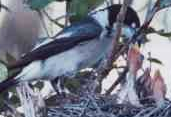Magpies Are Scared Of You!
Magpies are more scared of humans than people are of them. Show Them You Care
Magpies swooping at people. It's breeding time again and reports of magpies attacking people are making headlines again. The reality is Magpies are more scared of you than you imagine. Birds have to rely on behaviour to get their message across. Their language is not as complex as ours, besides we don't magpie anyway. So the bird swoop to tell you to stay away from a place.
Magpie parents are very protective and care deeply for their young. Recognise those qualities? Is it not the same for human parents wouldn't people proudly do the same for their kids?
The problem is that most people do not realise what is happening and don't know what to do when it does.
Magpies become aggressive when they have babies in the nest or when the chicks have just come out of the nest and are still learning to fly properly. During this period the birds are especially vulnerable. To get away from danger the chicks have to be strong enough to take off from the ground in a hurry It takes several weeks for the chick's muscles to develop to that level. The young birds also have to develop quicker reflexes in recognising the signs of approaching danger and also in learning exactly what action will take it to safety. Until then they can fly into the path of danger and get fatally injured. Now which caring parent would not take action to prevent some a tragedy in their family?
One of the real reasons this problem occurs in parks and pathways is the lack of trees and the positioning of the few trees that are around. Birds need trees for their nests and to roost at night. Areas like parks and pathways have been cleared of most of the trees, usually leaving only a single row of trees around the edges. So the birds who would normally in well treed area choose a tree in the middle of a group of trees where they can provide their young with adequate shelter are left with no choice but to occupy the narrow, scanty line still left standing.
Magpies are also ground feeders, that is, they have to potter on the ground listening for worms and bugs under the surface, which they then dig up for food. When the kids are young, they have to collect more food for their growing bodies and also teach them how to find their own food. The young have to learn to recognise the sounds under the surface, be strong enough to dig them up and also have to develop the muscles under their beaks to enable them to pick the food and manouvre it into their mouths and swallow it. Until then the parents and helper birds feed the chicks. They can't go into the wide open spaces, because should a hawk or eagle or any other predator attack, they cannot get their kids back to safety quickly. So they have to stay near the trees and scrub, where there is some natural cover.
Along come people walking around or cycling or children playing with balls totally oblivious to the dangers that the birds face while simply trying to live. What can a bird do, but try and tell the people to leave? And they do it the best way they know how, by showing them that they want them out. Swooping to them is the same as shooing and waving one's arms about, which is what people do when they want to tell someone to go away. The birds do not have the language to tell you what is worrying them and that they need the ground space over this time to look after their young. Once the kids are older and stronger they can fly off into more open areas looking for food and quickly get out of the way of predators.
So, what can people do to help?
The long term solution is two fold:
a) Make friends with the birds. Give them some food and water to show that you are friendly, you care for them, mean them well. (Not to make dependent, but as a means of showing your good intentions.) Talk to them long before breeding season starts. They will recognise you, learn your voice, answer you, and develop a trust in you.
b) Encourage your councils to keep more rows of trees along the roads and around parks etc. This gives them a proper corridor in which they can conduct their activities without falling in the way of human activities.
In the short term, while walking in regular walkways:
One - give the birds the room they need. Walk slowly. Talk to the birds. Again, if you go by daily, you may like to give them some food to build trust. This is particularly helpful to them during the breeding season. Because they will be less stressed about the time they lose in pottering for food, when the humans are occupying their space.
Many otherwise good hearted people feel reluctant to feed the birds and make friends with them at this time. Many of them are people passing by a particular area and feel annoyed with the birds who they think are attacking them without provocation. But when you look at it from the bird's point of view, what can he do to keep his babies safe? All the more reason to win the birds confidence, especially if their nest is on regular route. Once the bird recognises and you and learns to trust you he is less likely to attack you.
There are birds that get aggressive because they have had a bad experience with people. Some birds have personalities that are hypertense or overly nervous keeping them in over-reacting mode. Wear a cap or helmet. Carry a stick over your head. The birds tend to attack the highest spot and this will keep them away from your face and hands. One person drew two big eyes on the back of their cap and the birds stopped swooping at him.
If a bird is persistent inform the RSPCA or the Wildlife Carers in your area.

 del.icio.us
del.icio.us Digg
Digg Facebook
Facebook Google
Google Google+
Google+ LinkedIn
LinkedIn MySpace
MySpace Ping This!
Ping This! SlashDot
SlashDot StumbleUpon
StumbleUpon Twitter
Twitter Yahoo
Yahoo



